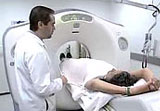Radical Radiotherapy for Lung Cancer
Radiotherapy has come a long way since it was first invented in the late 1880s, and today it can be used to fight off different types of cancer. One of the most common and deadly types of cancer is the one that affects the lung, and this year the American Cancer Society is projecting the death rate to be 221,130. Lung cancer also comes in different types such as small cell and non-small cell and at times, they might require different treatments or special doses. Radical radiotherapy for lung cancer has been mostly used for those patients that can’t be operated, or who have refused to have the operation done.
Complexity of Lung Cancer
Lung cancer is perhaps one of the most complicated types of cancer because it affects an extremely important part of the body. As you may know, a cancer is a produced by the reproduction of abnormal cells that continue to divide with no control and start affecting the functions of the organs. Every year, approximately one million people lose their battle against lung cancer, while others continue to fight it off with radical radiotherapy, chemotherapy or surgery. It is also quite common for the oncologist to perform a combination of all methods, in order to guarantee the extended survival of the patient. Radical radiotherapy for lung cancer is commonly used when the tumor has already advanced to the mid to late stages, and even though it won’t cure the problem per say, it will relieve the patient from pain related to cancer.
When Surgery is Not an Option
Among the different kinds of lung cancer, it is a lot more common to findnon-small cell lung cancer rather than small-cell cancer. In general, when they are detected very early, surgery is always the first option because it allows the patient to get rid of the problem quickly. The main concern arises when it’s already too late for surgery, or when the patient is not a candidate for surgery due to other medical reasons. This is when oncologists and doctors consider radical radiotherapy for lung cancer, which consists in using intensive and high-dose radiation against the group of abnormal cells. Clinical trials on radical radiotherapy for lung cancer have shown that the survival rate for patients has extended, but further testing is required.
Risk Factors & Statistics
As you may already know, one of the leading causes of lung cancer is cigarette smoking, and therefore, it’s the main risk factor that you should avoid. Studies have proven that the more you smoke and the longer you smoke the higher chances you will have of developing lung cancer. A lot of times smokers will refuse to have periodic check-ups, which leads to lung cancer going undetected until it’s already too late. In these cases, the oncologist might prescribe radical radiotherapy along with chemotherapy; however, if it’s already too late, radiotherapy might be done merely to relieve the patient from the pain and discomfort suffered from the deadly condition.

